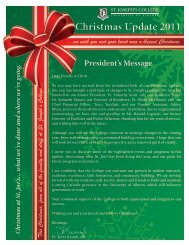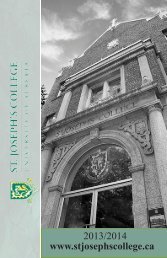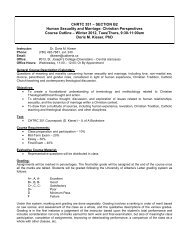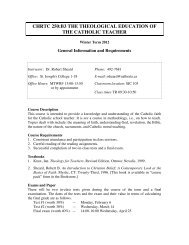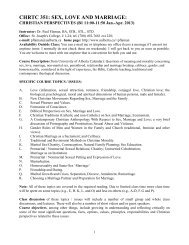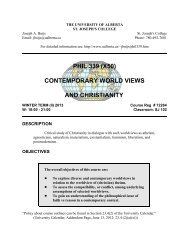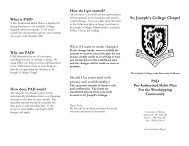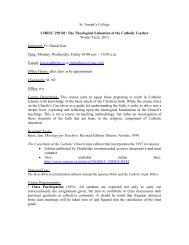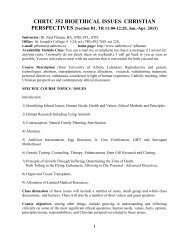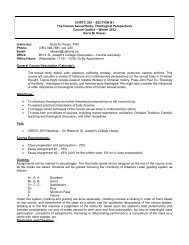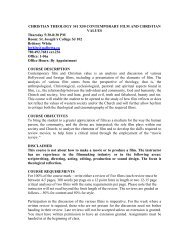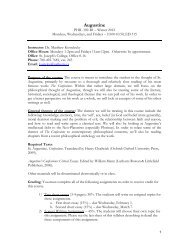Chrtc 292: Spirituality for Today's Christian - St. Joseph's College
Chrtc 292: Spirituality for Today's Christian - St. Joseph's College
Chrtc 292: Spirituality for Today's Christian - St. Joseph's College
You also want an ePaper? Increase the reach of your titles
YUMPU automatically turns print PDFs into web optimized ePapers that Google loves.
<strong>Chrtc</strong> <strong>292</strong>: <strong>Spirituality</strong> <strong>for</strong> Today’s <strong>Christian</strong><br />
Section B1, Tue. & Thur. 2-3:20 p.m., Jan.-Apr. 2012<br />
Instructor: Paul Flaman, B.A., S.T.B., S.T.L., S.T.D.<br />
Office: <strong>St</strong>. <strong>Joseph's</strong> <strong>College</strong>, # 1-24; tel. (780) 492-7681 ext 228;<br />
e-mail: pflaman@ualberta.ca home page: http://www.ualberta.ca/~pflaman<br />
Availability Outside Class: You can e-mail me or telephone me (leave a message if I am not in)<br />
anytime (note: I normally do not check these on weekends). I will get back to you as soon as<br />
possible. You are welcome to meet with me anytime that is convenient <strong>for</strong> both you and me.<br />
Course Description (from the University of Alberta Calendar): Developing an understanding of<br />
the role of prayer, leisure and work within a <strong>Christian</strong> lifestyle in the light of Scripture, <strong>Christian</strong><br />
tradition, current theological reflection, and personal differences.<br />
SPECIFIC COURSE TOPICS:<br />
Introduction<br />
Intimacy, Fear and Love<br />
Human Capacity <strong>for</strong> God and God’s Revelation, Scripture and Faith<br />
The Bible and <strong>Spirituality</strong><br />
Types of <strong>Christian</strong> <strong>Spirituality</strong> including Catholic, Orthodox and Protestant<br />
Personality Differences and Different <strong>Christian</strong> Spiritualities<br />
Jesus Christ as the Basis <strong>for</strong> <strong>Christian</strong> <strong>Spirituality</strong><br />
The Church and <strong>Christian</strong> <strong>Spirituality</strong><br />
God’s Salvation: Moral Law, Grace, Justification, <strong>Christian</strong> Holiness<br />
<strong>Christian</strong> Prayer<br />
Work and <strong>Christian</strong> <strong>Spirituality</strong><br />
Human Suffering and <strong>Christian</strong> <strong>Spirituality</strong><br />
Different <strong>St</strong>ates of Life (Vocations) and <strong>Spirituality</strong><br />
Marriage, Family Life and <strong>Spirituality</strong><br />
Some Developments in <strong>Christian</strong> <strong>Spirituality</strong><br />
Liberation, Justice and <strong>Spirituality</strong><br />
Feminist / Women’s <strong>Spirituality</strong><br />
Men’s <strong>Spirituality</strong><br />
Beauty and Aesthetic <strong>Spirituality</strong><br />
Tourism, Travelling, Pilgrimage and <strong>Spirituality</strong><br />
Ecology and <strong>Spirituality</strong><br />
Aids to Spiritual Growth<br />
Class discussion of these topics / issues will include a number of small group and whole class<br />
discussions, and lectures. There will also be a number of short videos and possibly one or more<br />
guest speakers.<br />
Course objectives, among other things, include gaining a better appreciation and understanding<br />
of a variety of classical and contemporary themes and approaches to <strong>Christian</strong> spirituality. These<br />
will be considered in the light of contemporary experience and needs. Hopefully, this will enable<br />
students (and the instructor) to develop (or further develop) a spirituality suited to their own<br />
personality, needs and lifestyle.<br />
1
COURSE REQUIREMENTS:<br />
A. Required Readings: <strong>St</strong>udent Course Pack: CHRTC <strong>292</strong> B1 <strong>Spirituality</strong> <strong>for</strong> Today’s <strong>Christian</strong><br />
P. Flaman Fall Term 2011 (<strong>for</strong> Winter Term 2012) . This includes a variety of readings related<br />
to the course topics. It is sold through the University of Alberta Bookstore.<br />
B. First Term Assignment, due Tue. 7 Feb. 2012 at the beginning of the class period, worth<br />
10% of the course mark. Visit a church / religious community other than your own and interview<br />
two members of the congregation / community. In about 500 words (written) describe the prayer<br />
/ worship service and worship space, as well as what the two members find meaningful / helpful<br />
regarding their religion / spirituality, its teachings and prayer, worship and/or meditation. Within<br />
the 500 words briefly describe (about 50-75 words) your experience or response. On or after the<br />
due date (there will be a sign up sheet), share briefly (about 5 minutes) key points regarding<br />
your visit and interviews with the class. More specific guidelines will be distributed during the<br />
first week of classes (see pp. 3-4 of the complete course syllabus).<br />
C. Mid-term Examination, Thur. 1 Mar. 2012, worth 20% of the course mark, written<br />
"closed-book", related to the required readings and class material up to the midterm.<br />
D. Second Term Assignment, due Thur. 22 Mar. 2012 at the beginning of the class period,<br />
worth 20% of the course mark, short research and reflection paper. In about 1500 words<br />
discuss a significant spiritual author (biblical, traditional / classical or more recent) or spirituality<br />
(<strong>Christian</strong> or other). Discuss the author or spirituality’s relevance <strong>for</strong> people today in the light of<br />
some primary texts, scholarly commentary, and your own experience and insights. On or after<br />
the due date (there will be a sign up sheet), share briefly (about 5 minutes) key points regarding<br />
your research and reflections with the class. More specific guidelines will be distributed during<br />
the first week of classes (see pp. 5-6 of the complete course syllabus).<br />
E. Class Participation, worth 10% of course mark, related to your involvement in small group<br />
and whole class discussions. Other means of contributing to the class such as providing the<br />
instructor with relevant web sites, articles, etc., will also be taken into account.<br />
F. Final Examination: worth 40% of the course mark, time and day determined by the<br />
university (scheduled 1400-1600, Thur. 19 Apr. 2012), written "closed-book", related to the<br />
assigned readings and class material <strong>for</strong> the whole course.<br />
Missed Term Work: Note that the percentage <strong>for</strong> missed term work will not be transferred to<br />
the final examination. Policy regarding deferred midterm and final exams will be distributed<br />
during the first week of classes.<br />
Note: If you have any questions concerning this course and/or course outline you are most<br />
welcome to telephone or e-mail me or come and see me (see number and addresses above). More<br />
in<strong>for</strong>mation regarding grading, cheating and plagiarism will be distributed the first week of<br />
classes. “Policy about course outlines can be found in § 23.4(2) of the University’s Calendar.”<br />
(GFC 29 SEP 2003)<br />
2
<strong>Chrtc</strong> <strong>292</strong> (P. Flaman) Guidelines <strong>for</strong> Assignment 1 (see p. 2, B of the course<br />
outline)<br />
This assignment is worth 10% of the course mark. It is to be typed, double-spaced text using 12<br />
point font, and about 500 words.<br />
First, visit a church/religious community other than your own. Note: the church/religious<br />
community must be significantly different from your own, e.g., if you are an evangelical<br />
<strong>Christian</strong> of one church/denomination do not visit another evangelical <strong>Christian</strong><br />
church/denomination which is substantially the same as yours, or if you are a Catholic do not<br />
visit another Catholic church/parish. One of the goals of this assignment is to expose you to a<br />
church/religious experience which is significantly different (at least in some respects) from what<br />
you are used to. If you do not belong to any church/religion, visit a church/religious community<br />
other than one you have visited be<strong>for</strong>e, if you have visited any.<br />
Second, interview two members of the congregation / community.<br />
Third, in about 425-450 words describe the prayer / worship service and worship space, as well<br />
as what the two members find meaningful / helpful regarding their religion / spirituality, its<br />
teachings and prayer, worship and/or meditation.<br />
Fourth, about 50-75 words, describe your experience or response. On or after the due date (there<br />
will be a sign up sheet), share briefly (about 5 minutes) key points regarding your visit and<br />
interviews with the class.<br />
For additional criteria regarding the marking of your paper see the “Marking Guide” on the other<br />
side of this sheet. Please attach this marking guide face up after the last page of your assignment. Keep<br />
a copy of your paper and hand in the original. If you have any questions or problems<br />
concerning this assignment, you are welcome to discuss them with me.<br />
Note: Late Penalty: If the written part of the assignments is handed in late, one mark out of 50<br />
will be docked <strong>for</strong> each day late (not including weekends or holidays). Extensions without<br />
penalty will be granted only by notifying the instructor and only <strong>for</strong> a serious reason beyond your<br />
control such as serious illness. An assignment not handed in at all will receive zero out of 100.<br />
The written part of the assignments will not be accepted after the final examination without<br />
proper written university authorization.<br />
See the other side / next page <strong>for</strong> a marking guide related to this assignment.<br />
3
Marking Guide <strong>for</strong> <strong>Chrtc</strong> <strong>292</strong> (Flaman) Assignment 1:<br />
Description of visit to a church / religious community, interview and your experience / response.<br />
Note: Please attach this sheet face up to the back of your assignment when you hand it in.<br />
Your assignment will be evaluated in four areas as indicated here:<br />
Content (written): _____________ / 25<br />
relevant meaningful<br />
in<strong>for</strong>mation, appropriate<br />
length <strong>for</strong> each part,<br />
some good insights ...<br />
Writing Skill: _____________ / 10<br />
clear, interesting,<br />
well-organized (title,<br />
introduction, logical sequence,<br />
paragraphs, conclusion),<br />
good style ...<br />
Grammar, Spelling, _____________ / 5<br />
Punctuation, Format<br />
Short Class<br />
Presentation (5 min.)<br />
and response to questions:<br />
good clear summary ... _____________ / 10<br />
Total Mark: _____________ / 50<br />
Besides the above general evaluations and comments, please note any specific check marks (re<br />
good points), as well as comments and corrections regarding some ways of improving your<br />
assignment.<br />
Thank You.<br />
4
<strong>Chrtc</strong> <strong>292</strong> (P. Flaman) Guidelines <strong>for</strong> Assignment 2 (see p. 2, D of the course outline)<br />
Short Research and Reflection Paper (Worth 25% of the course mark): In about 1500 words (typed, doublespace<br />
text, 12 point font) discuss a significant spiritual author (biblical, e.g. the Apostle Paul, the author of one<br />
of the Gospels; traditional / classical, e.g., Augustine, Aquinas, Teresa of Avila, John of the Cross, Martin<br />
Luther, John Calvin; or more recent, e.g., C.S. Lewis, Chiara Lubich, Jean Vanier, Henri Nouwen, Max<br />
Lucado) or spirituality (<strong>Christian</strong>, e.g., monastic, lay, Baptist, Pentecostal, Orthodox <strong>Christian</strong>, Focolare; or<br />
other, e.g., Jewish, Islamic, Buddhist). Discuss the author or spirituality’s relevance <strong>for</strong> people today in the light<br />
of some primary texts (that is, of the original author, e.g., one or more of the Apostle Paul’s letters), scholarly<br />
commentary (use at least two sources, e.g., scholarly commentaries of the Apostle Paul’s Letter to the Romans<br />
or scholarly introductions, book reviews or articles on a particular author’s book, or about a particular<br />
spirituality), and your own experience and insights. On or after the due date (there will be a sign up sheet),<br />
share briefly (about 5 minutes) key points regarding your research and reflections with the class.<br />
Include references to the sources you use. If you wish to write a significantly longer paper <strong>for</strong> your own<br />
purposes please indicate which part you wish evaluated <strong>for</strong> this course. The paper must be theological (a<br />
theological source includes God and/or religious faith in discussing issues), but may also integrate material from<br />
other disciplines that is relevant to your topic (e.g. psychology, sociology, anthropology and/or philosophy,<br />
etc.). You may not hand in an essay from another course or an essay written by someone else. Show sufficient<br />
research (although you may use required reading materials, you must show signs of using at least three sources<br />
including two scholarly sources (i.e. published in a scholarly book or journal) other than the required readings,<br />
but probably not more than eight) and properly acknowledge your sources (follow one standard academic<br />
<strong>for</strong>mat consistently), giving page or section numbers <strong>for</strong> quotations and specific references (e.g. names, ideas or<br />
other specific in<strong>for</strong>mation). Regarding biblical references, give in abbreviated <strong>for</strong>m the appropriate book,<br />
chapter and verses, e.g., 1 Cor 7:2-9 - indicate the translation of the Bible that you use in your notes or reference<br />
list.<br />
Your paper should be primarily a research paper including mainly summary of pertinent material from<br />
your reading. It should not be mainly a compilation of quotations. It should include some of your own analysis,<br />
insights and personal conclusions (150 words or more) relevant to your topic. Read to become in<strong>for</strong>med on your<br />
topic, think, pray and organize your own paper. Be fair to your sources (e.g., if you disagree with a certain<br />
writer's view do not exaggerate or distort his or her position - try to understand what he or she actually meant to<br />
say in the context) and present your insights in a clear and balanced way.<br />
Reference materials such as a good commentary of the Bible, a good encyclopedia (e.g. the New Catholic<br />
Encyclopedia) or dictionary of theology are often good places to begin theological research. With regard to theological<br />
(and philosophical) sources, <strong>St</strong>. <strong>Joseph's</strong> <strong>College</strong> Library, down the East stairway of <strong>St</strong>. <strong>Joseph's</strong> <strong>College</strong>, aims to have<br />
adequate resources to serve its students. Its librarians are very willing to serve you. Among other resources which may be<br />
helpful <strong>for</strong> your research, the Catholic Periodical and Literature Index is on the Computer CD-Rom Workstation (the print<br />
edition to the end of 2002 is also in the library). <strong>St</strong>. <strong>Joseph's</strong> <strong>College</strong> Library holdings, as well as the library holdings of a<br />
number of other <strong>Christian</strong> colleges in the Edmonton area, are online through NEOS/GATE. See the University of Alberta<br />
Libraries web page (www.library.ualberta.ca/). For many sources specifically related to the course contents see the<br />
sources referred to in the course’s required readings. There are many resources, including theological resources, on<br />
spirituality in the Edmonton area and on the Internet (<strong>for</strong> some relevant links see: :<br />
www.ualberta.ca/~stjoseph/resource_pages/resourcelink.html and www.ualberta.ca/~pflaman/links.html<br />
For additional criteria regarding the marking of your paper see the Marking Guide on the other side of this sheet.<br />
Note: Please attach this sheet facing up as the last page of your essay when you hand it in. Keep a copy of your paper and<br />
hand in the original. If you have any questions or problems concerning this assignment, you are welcome to discuss them<br />
with me.<br />
Late Penalty: If the essay is handed in late, one mark out of 50 will be docked <strong>for</strong> each day late (not including<br />
weekends or holidays). Extensions without penalty will be granted only by notifying the instructor and only <strong>for</strong> a serious<br />
reason beyond your control such as serious illness. A paper not handed in at all will receive zero out of 100. The paper<br />
will not be accepted after the final examination without proper written university authorization.<br />
5
Marking Guide <strong>for</strong> <strong>Chrtc</strong> <strong>292</strong> (Flaman) Assignment 2<br />
Note: Please attach this sheet facing up as the last page of your essay when you hand it in.<br />
Comments<br />
1) research: sufficient usage _______ /25<br />
of appropriate sources including<br />
scholarly, relevant in<strong>for</strong>mation,<br />
accurate, appropriate length...<br />
2) personal insights: re topic _______ /10<br />
and sources, writer attempts<br />
to arrive at sound conclusions,<br />
reasons given, good analysis<br />
and understanding...<br />
3) writing skill: clear, _______ /5<br />
balanced, well-organized<br />
(introduction, paragraphing,<br />
conclusion), logical sequence,<br />
flows well, good transitions,<br />
interesting, good style...<br />
4) <strong>for</strong>mat: proper referencing _______ /5<br />
of sources (quotations,<br />
ideas, in<strong>for</strong>mation), proper<br />
<strong>for</strong>mat re notes/bibliography,<br />
title page, subtitles, proper<br />
margins, spacing, page numbering,<br />
proper spelling, grammar,<br />
punctuation ...<br />
5) Short class presentation _______ /5<br />
Good clear summary ...<br />
Total Mark: /50<br />
NB: 1: See the other side re expectations <strong>for</strong> the paper concerning content and <strong>for</strong>mat. Since this is an<br />
academic paper in theology (i.e. a humanity's subject) do not use contractions, and write out numbers under 100<br />
in the body of the paper. Explain any abbreviations used.<br />
NB: 2: Besides the above general evaluations and comments, please note any specific check marks (re good<br />
points), as well as comments and corrections regarding some ways of improving your paper.<br />
Thank you -<br />
_________________<br />
6
<strong>Chrtc</strong> <strong>292</strong> (Paul Flaman), <strong>St</strong>. Joseph’s <strong>College</strong>, University of Alberta<br />
Access to course evaluative material (GFC 18 June 2007): Copies of some of this course’s previous<br />
final examinations are available from the <strong>St</strong>udent’s Union Exam Registry. I will also pass out in class some<br />
sample midterm exam questions at least one week be<strong>for</strong>e the midterm exam and some sample final exam<br />
questions be<strong>for</strong>e the end of classes to help you prepare <strong>for</strong> both examinations.<br />
For in<strong>for</strong>mation on Specialized Support and Disability Services see:<br />
http://www.uofaweb.ualberta.ca/SSDS/<br />
Grading: <strong>St</strong>udents in this course will be graded following the U. of A. Letter Grading System, as follows:<br />
Grading in Undergraduate Courses<br />
Descriptor Letter Grade Point Value<br />
Excellent<br />
Good<br />
Satisfactory<br />
Poor<br />
Minimal Pass<br />
A+<br />
A<br />
A-<br />
B+<br />
B<br />
B-<br />
C+<br />
C<br />
C-<br />
D+<br />
D<br />
Failure F or F4 0.0<br />
Under this system, marking and grading are done separately. Grading involves a ranking in order of merit based<br />
on raw scores, an assessment of the class as a whole, and the qualitative descriptions of the various grades.<br />
Grading is in the first instance a judgment of the instructor based upon the student's total per<strong>for</strong>mance and<br />
includes consideration not only of marks earned <strong>for</strong> term work and final examination, but also of class<br />
participation, completion of assignments, a comparison of the class as a whole with other classes, etc. A predetermined<br />
distribution of grades, e.g., a bell curve, is not used. Grades are subject to revision according to<br />
procedures and policies of the Faculty of Arts.<br />
Academic Integrity, Cheating and Plagiarism: "The University of Alberta is committed to the<br />
highest standards of academic integrity and honesty. <strong>St</strong>udents are expected to be familiar with these standards<br />
regarding academic honesty and to uphold the policies of the University in this respect. <strong>St</strong>udents are<br />
particularly urged to familiarize themselves with the provisions of the Code of <strong>St</strong>udent Behaviour (online at<br />
www.governance.ualberta.ca/CodesofConductandandResidenceCommunity<strong>St</strong>andards/Codesof<strong>St</strong>udentBehavior.<br />
aspx) and avoid any behavior which could potentially result in suspicions of cheating, plagiarism,<br />
misrepresentation of facts and/or participation in an offence. Academic dishonesty is a serious offence and can<br />
result in suspension or expulsion from the University."(GFC 29 SEP 2003) Since the examinations in this<br />
7<br />
4.0<br />
4.0<br />
3.7<br />
3.3<br />
3.0<br />
2.7<br />
2.3<br />
2.0<br />
1.7<br />
1.3<br />
1.0
course are closed-book, cheating constitutes any obtaining (or attempting to obtain) in<strong>for</strong>mation from another<br />
student or any other unauthorized source (e.g. required reading materials or notes) during the exams, or using<br />
any other method of cheating. All students should consult the "Truth-In-Education" handbook or Website<br />
(http://www.uofaweb.ualberta.ca/TIE/) regarding the definitions of plagiarism and its consequences when<br />
detected. Plagiarism means to steal the ideas, words, images or data of another and pass them off as one's own<br />
without crediting the source (note the research assignment directives regarding properly referencing quotations<br />
and specific sources of in<strong>for</strong>mation). Properly acknowledge all your immediate sources including speakers or<br />
interviews. No student shall submit in any course all or a substantial portion of any academic writing, essay,<br />
thesis, research report, project assignment, presentation or poster <strong>for</strong> which credit has been obtained by the<br />
student or which has been or is being submitted by the student in another course or program of the student in the<br />
University or elsewhere. A student who is caught cheating or plagiarizing a substantial part of one's assignment<br />
will receive nothing <strong>for</strong> that exam or assignment. The student will also be reported to the proper University of<br />
Alberta authorities. See the Code of <strong>St</strong>udent Behavior regarding various penalties (30.4.2) including expulsion,<br />
and so <strong>for</strong>th. If one is having problems with an assignment or is excessively anxious about an examination, talk<br />
to the instructor be<strong>for</strong>ehand. I will try to be reasonably flexible and fair.<br />
Deferred Exams: A deferred midterm exam will be granted at the discretion of the instructor on 15 Mar.<br />
2012 from 3:30-4:30 p.m. at a place determined by the instructor. <strong>St</strong>udents will be required to present<br />
acceptable proof of a valid reason <strong>for</strong> missing a scheduled midterm examination within two business days of the<br />
missed examination, or as soon as the student is able. In the case of sickness, where a student chooses not to<br />
present a medical note, the student may be required to complete an Illness Declaration <strong>for</strong> Missed Examinations<br />
<strong>for</strong>m, upon request by the instructor. <strong>St</strong>udents must see Hana Irving, Assistant to the Academic Dean, or Brian<br />
Maraj, Academic Dean, at <strong>St</strong>. <strong>Joseph's</strong> <strong>College</strong> to fill out an Illness Declaration. The deferred final exam <strong>for</strong><br />
this course will be held on 16 May 2012 at from 2-4 p.m. at a place determined by the instructor. <strong>St</strong>udents who<br />
need to write a deferred examination must present adequate proof of their inability to attend to the student's<br />
Faculty Office, no later than two working days after the scheduled exam date or as soon as the student is able.<br />
In the event of absence due to sickness, a student may be required to swear a <strong>St</strong>atutory Declaration if they<br />
choose not to present a medical note. The fee <strong>for</strong> a deferred final exam is: $47.82, payable in advance. (Subject<br />
to change under calendar regulation §23.5).<br />
Reexamination: In<strong>for</strong>mation on reexamination policies is available in the University of Alberta's Calendar,<br />
23.5.5, or from the Arts Office. All students enrolled in <strong>St</strong>. <strong>Joseph's</strong> <strong>College</strong>'s courses and seeking<br />
reexamination must meet the criteria <strong>for</strong> eligibility of the Faculty of Arts and, if from another faculty, the<br />
criteria of their own faculty as well.<br />
A Few Questions Regarding the Required Readings to help you prepare <strong>for</strong> small group<br />
and/or whole class discussions:<br />
1. What is the author's (authors') position (main points, conclusions, values, insights...)?<br />
2. How does this reading relate to other things you have heard, read, seen and/or experienced<br />
regarding the topic?<br />
3. Do you agree with the author(s)? With everything, with most, only some things, or nothing<br />
that he/she (they) says? Why?<br />
4. What other questions and/or concerns does the reading raise <strong>for</strong> you?<br />
8



